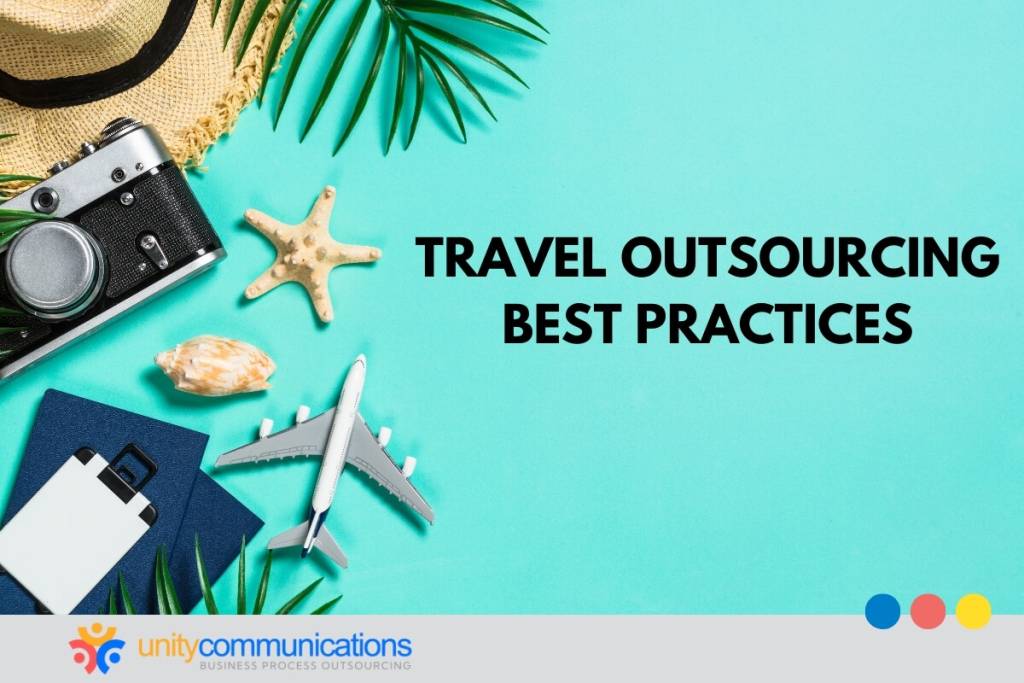Table of Contents
Business process outsourcing (BPO) offers many advantages for the travel and tourism industry. It helps agencies streamline processes, improve scalability and agility, focus on core competencies, and reduce costs.
However, choosing a provider that meets your needs is key to maximizing these benefits. Establishing strong control measures and regularly monitoring outsourced operations are also essential.
If you’re considering engaging in a travel BPO partnership, this article is for you. It explores the best practices for travel outsourcing and provides quick tips for applying them. Keep reading to succeed in outsourcing!
1. Choose the right travel outsourcing partner

The first step to succeed in outsourcing is to find a reliable BPO provider that aligns with your goals and needs. To better understand why this is critical, it’s best to first answer the question: What is BPO?
Business process outsourcing is offloading back- and front-office tasks to an external team. In travel BPO, you can access tourism and hospitality experts and cutting-edge technologies relevant to your services. That’s how outsourcing works.
Your BPO partner sets the tone for your entire outsourcing initiative. Their background and services can give you an idea about the quality of the extended workforce and the tools to gain in the partnership.
How do you determine which outsourcing provider is best for your travel agency? Here are the steps you shouldn’t skip when deciding:
Set clear objectives and scope
Determine what you want to achieve through outsourcing, whether reducing costs, enhancing efficiency, or improving customer service. According to Deloitte’s 2022 Global Outsourcing Survey, 49% of executives want to gain new capabilities through BPO services. However, cost reduction remains the top driver, with 57% of respondents citing it.
After setting the goals, the next best practice is to outline the travel services you want to outsource. Here are some processes travel BPO providers can cover:
- Travel bookings (e.g., flight, hotel, car rental, tour, and events reservations)
- Expense management (e.g., expense reporting, policy compliance, expense audits)
- Itinerary planning (e.g., trip planning, visa and passport assistance, and documentation)
- Traveler support (e.g., 24/7 assistance, travel advisories, and concierge services)
Conduct thorough research
After you’ve determined your goals and needs, short-list potential BPO partners. Research and compare different travel outsourcing providers based on the following factors:
- Experience: How long has the provider been in the business? Do they have expertise in the specific areas of travel management you need?
- Industry reputation: What is the provider’s reputation in the travel industry? Are they known for quality service, reliability, and innovation?
- Service offerings: Do they offer the specific services you require, such as flight bookings, hotel reservations, expense management, or event planning?
- Customization: Can they tailor their services to your organization’s unique needs and preferences?
- Technology platform: Do they use a modern, user-friendly technology platform that integrates with your systems?
- Pricing: How do their rates compare to other providers in the market? Are their fees transparent and competitive?
Another best practice when researching travel outsourcing providers is to check references and client reviews. This step can help you gain more insights into the BPO company’s quality of service, responsiveness to change, and problem-solving capability.
Request a trial period
Experiencing working with a BPO team firsthand is still the best way to see how well they match with your travel agency. Request a pilot period to better understand their strategies, solutions, and processes and evaluate potential costs and returns on investment (ROI).
Before engaging, develop a service-level agreement (SLA) to guide the BPO team in working with your travel agency. Specify the scope of work and performance metrics, such as turnaround time, accuracy, uptime, etc. These help you monitor their performance and provide constructive feedback during the project.
2. Establish and implement clear control measures

Outsourcing tasks to a third-party team also means delegating some control. Implementing strong quality control measures is a best practice to ensure the travel outsourcing provider meets expectations and delivers the value you expect.
This step is also critical in maintaining excellent customer service and support experience. But what is customer support experience? It’s the overall quality of the consumer’s encounter with your travel agency’s support team. You provide exceptional customer service if your internal and BPO team can consistently perform high-quality work.
When creating control measures, first set performance benchmarks. Define specific metrics and measurable goals to accurately evaluate your travel BPO team’s performance. Some typical key performance indicators (KPIs) include the following:
- Booking accuracy: the percentage of bookings made correctly and without errors
- Response time: the average time it takes for the provider to respond to inquiries or requests
- Customer satisfaction: feedback from travelers regarding their overall experience with the provider
- Cost savings: the amount of money saved through outsourcing travel services
- Compliance with policies: adherence to corporate travel policies and guidelines
- On-time delivery: the percentage of travel arrangements delivered on time
- Problem resolution time: the average time it takes to resolve issues or problems that arise
Another best practice is to keep your travel outsourcing KPIs aligned with your agency’s business goals and needs.
Next, create a comprehensive quality assurance framework that details tracking procedures. These include conducting audits, collecting data, and analyzing results. Once established, you can assign responsibilities within the framework.
3. Conduct regular monitoring and audits

As with most business practices, BPO in travel and tourism always has room for improvement. Constant monitoring and evaluation are essential to succeed in outsourcing.
Data collection and analysis, regular audits, and feedback gathering are three ways to monitor your BPO processes regularly. Let’s explore each in detail:
Collect and analyze data
Consider using specialized quality management tools to track your established KPIs and framework. Some popular technologies include ISOtools, Helix QAC, Travelport Galileo, Amadeus, and Sabre.
This software automates processes, tracks performance metrics, and generates reports from various sources. Examples include booking systems, expense reports, customer feedback, and performance metrics.
Conduct regular audits
When conducting regular audits, introduce an element of randomness to prevent BPO teams from anticipating it. Gather data using various methods, such as document reviews, interviews, surveys, and mystery shopping.
It’s best practice to use the data about your travel outsourcing operations for the following:
- Identify outliers (e.g., errors, fraud, or other issues).
- Track changes (e.g., areas of improvement or decline).
- Compare benchmarks (e.g., industry standards or internal standards).
- Forecast performance (e.g., booking volumes, expenses, or potential risks).
- Optimize resource allocation (e.g., staffing levels or technology investments).
Gather customer and internal employee feedback
Collect customer feedback through surveys, online reviews, and social media listening to determine service improvement after outsourcing. Ask them what they think about the following:
- Booking process
- Customer service
- Accommodation quality
- Overall satisfaction
Regular surveys for your in-house employees are also critical to track your BPO partner’s performance. The insights help you gauge their satisfaction with the provider’s services and support and identify challenges they might face working with an external team. You can also solicit suggestions for improvement from these employee surveys.
The bottom line
Although outsourcing is a cost-efficient strategy for gaining a competitive edge in the travel industry, it can cost more without adequate preparation. Your partner, quality control measures, and proactiveness in monitoring operations can make or break your initiative.
To maximize the benefits of travel BPO and get the most value for your money, follow the best practices mentioned in this article. By finding a compatible travel outsourcing provider, establishing clear quality standards, and regularly auditing BPO operations, you set your travel agency up for success.
Are you considering travel outsourcing but don’t know where to start? Let’s connect, and we can start on a trial period to find the best solution for your needs.




